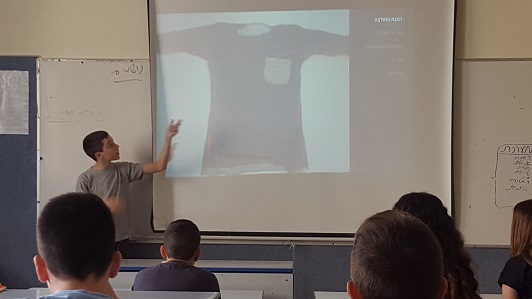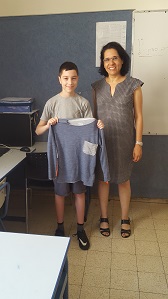


Executing the T-Shirt for Any Size initiative at the Mordei HaGetaot school in Ramat-Gan
Yair, a third-grade student, had an idea for a T-shirt for any size. Yair prepared a preliminary sketch and formed a team. They met with a clothes designer, sewed a shirt, and conducted a survey among the students and teachers. The survey proved that the T-shirt has great potential for success.
As part of the Young Entrepreneur Leadership program at Mordei HaGetaot school in Ramat-Gan, students in grades 3rd-5th participated in entrepreneurship lessons, based on the Entrepreneurship for Kids Program.
The students generated ideas for ventures/projects, and some of them were implemented and put into action.
One student, Yair, came up with the idea of a "T-Shirt for Any Size."
The origin of the idea was the sci-fi movie Back to the Future, in which the hero pushed a button, enabling him to enlarge or shrink the size of his clothing.
Yair thought it was a good idea to sew such a T-shirt because it would save parents money when buying clothes for kids. As a child grows, their shirt will also grow.
Yair presented his idea to the entrepreneur leaders' class, and his classmates asked him questions to ensure they understood his concept clearly.
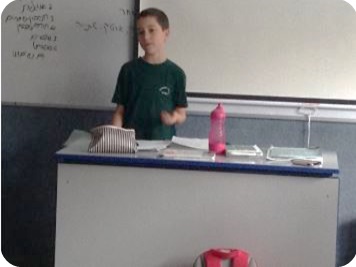
Below are the questions that were asked:
- How can one shirt fit all sizes?
- Is it one shirt that fits all sizes or several shirts in several formats?
- What is the shirt made of?
- What is the goal of this shirt?
Yair did his best to answer all of the questions.
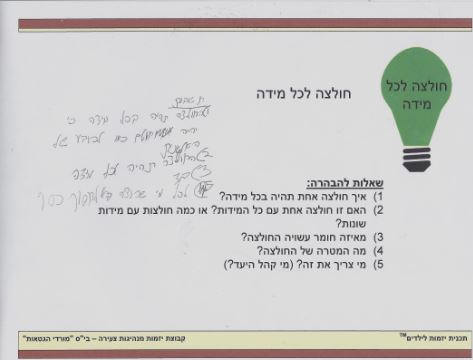
In doing so, he sketched an outline of the shirt as he saw it in his mind:

To move forward with developing the initiative, we spoke with Rotem Eyal, an Israeli designer and owner of "Boo Designer Clothing," and scheduled a visit to her shop. We wanted Yair to present his idea to Rotem and to hear her professional opinion.
We knew Rotem from Global Entrepreneur Week. She was invited as a guest entrepreneur to the Mordei HaGetaot school and shared her experience as a fashion entrepreneur with the students.
We took a minibus to the shop on Shenkin Street in Tel-Aviv.

We met Rotem, and she told us how she built her business. Initially, Rotem sold only fashion accessories.
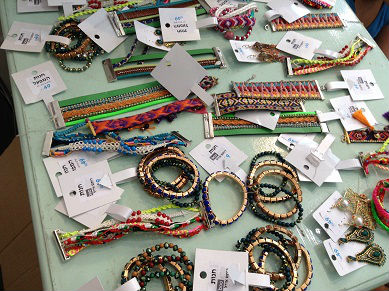
After a year, Rotem realized that for the business to work, she should also add clothes with a personal design. She studied the fashion curriculum for three years to accomplish that goal. While she was studying, she opened a clothing shop in her design, which offers comfort for working women.
Rotem explained the process of sewing clothes: Draw a model on a page, prepare the model according to the correct body proportions, and then have the fabric cut. The students saw a template for sewing pants.
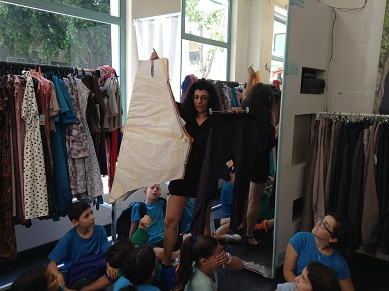
The students also felt with their hands the different kinds of fabrics: Elastic, cloth, and lattice.

Yair presented the "T-Shirt for Any Size" initiative to Rotem and his peers.
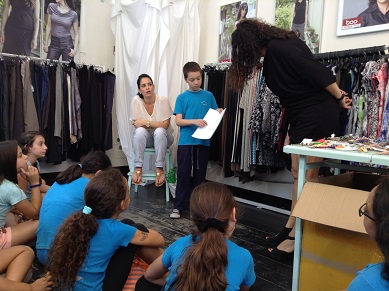
Rotem said that the idea was nice, engaging, and absolutely doable. She advised Yair to check if there is a need for such a product. According to her, the fashion issue has a significant impact on the clothing industry.
In response, the students asked: "How do you know whether the clothes you design will be sold or not?"
Rotem answered that it is due to a combination of experience, intuition, and orientation that helps her know that.
The kids thanked Rotem for hosting them and for the counseling. Then they went out to wait for the minibus to take them back to school.
While waiting for the minibus to come, Orit Barashi, Geffen's mom and owner of the Beresheet Bridal Studio, explained to the students the difference between a casual clothing boutique and a bridal dress boutique.
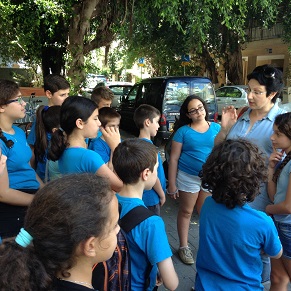
At that point, Geffen and Shani joined Yair's venture, forming a team. Together, they developed a shirt for all sizes.
They met with Orit Barashi at her studio in Ramat-Gan after she agreed to help design and sew the shirt. Together, the young entrepreneurs worked on the design, chose the type of fabric, and determined how the sizes of the shirt could be adjusted to fit.
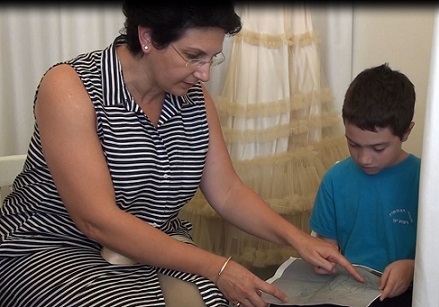
After the young entrepreneurs met with Orit several times, a shirt for all sizes was designed and sewn. It was a shirt that could be enlarged or shrunk to fit four different sizes.

You can change the size of the shirt with hidden snap buttons along the sleeves and down the side of the shirt. Those hidden buttons can shrink or enlarge the shirt by two sizes.
Additionally, you can adjust the shirt's size by two additional sizes by using a colorful and stylish zipper that runs along the sleeves and down the side of the shirt.
Yair, Geffen, and Shani decided to call it HEN for the following reasons:
- HEN is the Hebrew word for beauty.
- The letters of HEN in Hebrew can be an acronym for the stretching shirt
- HEN is a unisex name, and the shirt is also unisex.
To market the shirt, the young entrepreneurs defined the benefits of the shirt:
- It saves money for parents because the shirt grows with the child.
- It saves room in the closet because people who wear it can buy fewer shirts.
- It is reasonably priced for everyone - 60 to 70 NIS.
- It can be worn loose or tight.
The entrepreneurs had to determine whether there was a market need for their product. For that purpose, the young entrepreneurs presented the shirt to school teachers and asked them to complete a survey. Every teacher, without exception, loved the idea. Some even offered to help design and market the shirt for pregnant women whose bodies change during pregnancy.
The entrepreneurial students survey the teachers:
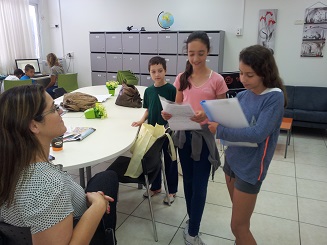
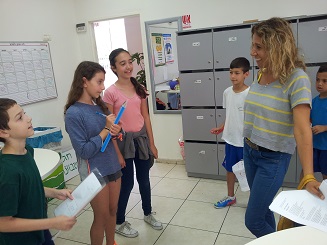
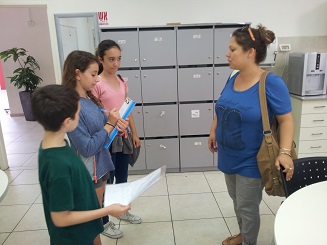
The students also presented the idea to the school principal, Ronni Shasha. Ronni loved the idea very much and suggested turning the product into a business venture with the help of her parents. Ronni also advised the students to offer the product to clothing stores, which could help market their shirt. The young entrepreneurs were thrilled about the support they received from the director.
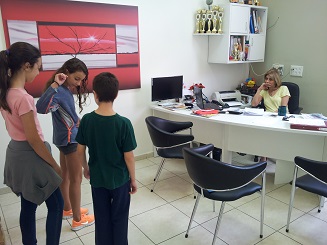
The teachers represented the parents, who were responsible for the actual payment and purchase. Still, the young entrepreneurs realized that the real target audience was the students, who were supposed to wear the shirts. This is why they presented their idea to a representative group of their classmates and asked them whether they would buy the T-shirt or not.
As you can see in the picture, almost all students voted in favor of the initiative, indicating their interest in purchasing the shirt.
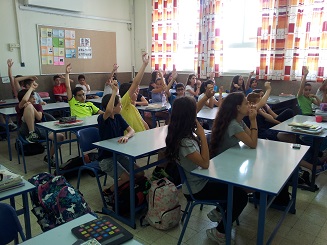
At the same time, a television program called The Initiative was aired, seeking young entrepreneurs. Given that, Yair, Geffen, and Shani made their way to the production offices and presented their initiative. They were invited to appear on the set, but due to a scheduling conflict, they were unable to take advantage of the opportunity.
We should mention that the entrepreneurs of the Storage Table initiative were also invited to the production office to present their idea. Two schools that conduct the Entrepreneurship for Kids Program, one of which is the Yad-Mordechai school in Bat-Yam, won first place for developing silicone can tops. The second initiative of the Kaplan school in Petah Tikva, where students planned to establish a playground for people with disabilities, was supported on the air by the mayor of Petah Tikva. The mayor expressed his willingness to integrate the students' initiative into a designated parking lot, benefiting children with disabilities.
Photos from the audition:

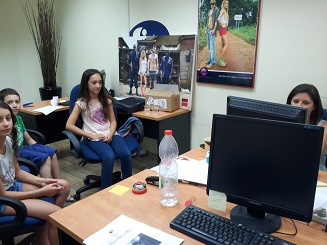
At the production offices:
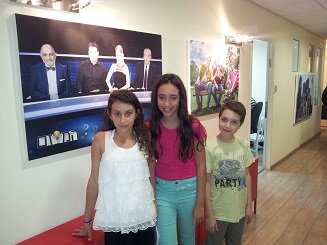
Young entrepreneur students' parents summed up the process their kids had gone through:
"The kids went through a great process and result.
We hope for new and exciting projects next year."
"The kids all gained an interesting, challenging, and very developmental experience. Thank you for the support and encouragement you gave the kids throughout the process."
Here is a summary presentation of the T-Shirt for Any Size initiative:
Update After Four Years:
When discussing meaningful learning, entrepreneurship education is undoubtedly the answer. Today, we got further proof of that:
Four years after participating in the entrepreneurship curriculum for kids, Yair, who graduated seventh grade, presented the T-shirt for Any Size initiative to his classmates and told them all about the entrepreneurial process.
Good luck to Yair in the future. Thanks for letting Galit Zamler come to see you presenting the project HEN - "T-Shirt for Any Size".
Yair, as a seventh grader, is presenting the project:
